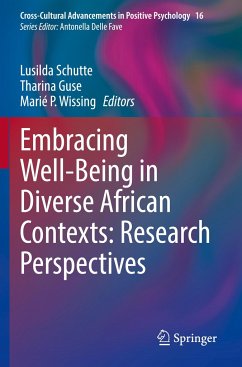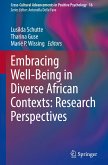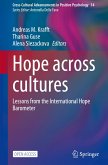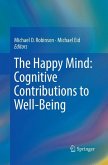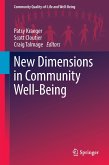Embracing Well-Being in Diverse African Contexts: Research Perspectives
Herausgegeben:Schutte, Lusilda; Guse, Tharina; Wissing, Marié P.
Embracing Well-Being in Diverse African Contexts: Research Perspectives
Herausgegeben:Schutte, Lusilda; Guse, Tharina; Wissing, Marié P.
- Broschiertes Buch
- Merkliste
- Auf die Merkliste
- Bewerten Bewerten
- Teilen
- Produkt teilen
- Produkterinnerung
- Produkterinnerung
This is the first volume providing a research platform to showcase research in the field of positive psychology and well-being science in African contexts. Next to enhancing context-sensitive theory and practice on the African continent, it also contributes to the global discourse in positive psychology and facilitates the development of a science that reflects and is relevant to complexity and diversity in a globalising society. This volume brings together work from African scholars, featuring research on theoretical perspectives on well-being in Africa, measurement of well-being in Africa,…mehr
Andere Kunden interessierten sich auch für
![Embracing Well-Being in Diverse African Contexts: Research Perspectives Embracing Well-Being in Diverse African Contexts: Research Perspectives]() Embracing Well-Being in Diverse African Contexts: Research Perspectives89,99 €
Embracing Well-Being in Diverse African Contexts: Research Perspectives89,99 €![Hope across cultures Hope across cultures]() Hope across cultures105,99 €
Hope across cultures105,99 €![Encyclopedia of Quality of Life and Well-Being Research Encyclopedia of Quality of Life and Well-Being Research]() Encyclopedia of Quality of Life and Well-Being Research3.318,99 €
Encyclopedia of Quality of Life and Well-Being Research3.318,99 €![The Happy Mind: Cognitive Contributions to Well-Being The Happy Mind: Cognitive Contributions to Well-Being]() The Happy Mind: Cognitive Contributions to Well-Being161,99 €
The Happy Mind: Cognitive Contributions to Well-Being161,99 €![Future Directions in Well-Being Future Directions in Well-Being]() Future Directions in Well-Being53,99 €
Future Directions in Well-Being53,99 €![New Dimensions in Community Well-Being New Dimensions in Community Well-Being]() New Dimensions in Community Well-Being81,99 €
New Dimensions in Community Well-Being81,99 €![Well-Being, Positive Peer Relations and Bullying in School Settings Well-Being, Positive Peer Relations and Bullying in School Settings]() Phillip T. SleeWell-Being, Positive Peer Relations and Bullying in School Settings57,99 €
Phillip T. SleeWell-Being, Positive Peer Relations and Bullying in School Settings57,99 €-
-
-
This is the first volume providing a research platform to showcase research in the field of positive psychology and well-being science in African contexts. Next to enhancing context-sensitive theory and practice on the African continent, it also contributes to the global discourse in positive psychology and facilitates the development of a science that reflects and is relevant to complexity and diversity in a globalising society. This volume brings together work from African scholars, featuring research on theoretical perspectives on well-being in Africa, measurement of well-being in Africa, manifestations and dynamics of well-being in Africa, and well-being promotion in Africa. It stimulates further research in positive psychology and well-being science in the African context and globally, and emphasises the interconnectedness and situatedness of human functioning and well-being, contributing to a more balanced perspective on well-being in an international perspective.
The volume benefits researchers, students and practitioners in Africa and other international contexts who study or apply the science of positive psychology and well-being in diverse contexts.
Chapter 1 is available open access under a Creative Commons Attribution 4.0 International License via link.springer.com.
The volume benefits researchers, students and practitioners in Africa and other international contexts who study or apply the science of positive psychology and well-being in diverse contexts.
Chapter 1 is available open access under a Creative Commons Attribution 4.0 International License via link.springer.com.
Produktdetails
- Produktdetails
- Cross-Cultural Advancements in Positive Psychology 16
- Verlag: Springer / Springer International Publishing / Springer, Berlin
- Artikelnr. des Verlages: 978-3-030-85926-8
- 1st edition 2022
- Seitenzahl: 444
- Erscheinungstermin: 20. Mai 2023
- Englisch
- Abmessung: 235mm x 155mm x 23mm
- Gewicht: 749g
- ISBN-13: 9783030859268
- ISBN-10: 3030859266
- Artikelnr.: 67827784
- Herstellerkennzeichnung
- Books on Demand GmbH
- In de Tarpen 42
- 22848 Norderstedt
- info@bod.de
- 040 53433511
- Cross-Cultural Advancements in Positive Psychology 16
- Verlag: Springer / Springer International Publishing / Springer, Berlin
- Artikelnr. des Verlages: 978-3-030-85926-8
- 1st edition 2022
- Seitenzahl: 444
- Erscheinungstermin: 20. Mai 2023
- Englisch
- Abmessung: 235mm x 155mm x 23mm
- Gewicht: 749g
- ISBN-13: 9783030859268
- ISBN-10: 3030859266
- Artikelnr.: 67827784
- Herstellerkennzeichnung
- Books on Demand GmbH
- In de Tarpen 42
- 22848 Norderstedt
- info@bod.de
- 040 53433511
Lusilda Schutte, holding a PhD degree in psychology and a Masters degree in statistics, is an associate professor in the Africa Unit for Transdisciplinary Health Research at the North-West University in South Africa, as well as a registered and practicing clinical psychologist. She is the principal investigator of a funded research project (2020-2022) that examines the conceptualisation, measurement, dynamics, and correlates of well-being in diverse contexts. She has been invited to present at the 6th World Congress of Positive Psychology in 2018, to convene a symposium at the International Congress of Psychology in 2021, and to present guest lectures in the USA and Croatia. She is an Associate Editor of Springer's Journal of Well-being Assessment, a Review Editor of Quantitative Psychology and Measurement, part of the journals Frontiers in Applied Mathematics and Statistics and Frontiers in Psychology, an Editorial Board member of the Journal of Happiness Studies,and she chaired the first Africa Positive Psychology Conference in 2018. She previously lectured statistics and worked as a statistical consultant at the North-West University and as a clinical psychologist at a government-funded psychiatric hospital in South Africa. Tharina Guse is a counselling psychologist, professor, and Head of the Department of Psychology at the University of Pretoria. Her broad research area concerns the field of positive psychology. In particular, she is interested in examining factors related to youth well-being, including interventions to maintain and promote their psychological well-being. Tharina further investigates the nature, dynamics and mechanisms of psychological strengths, specifically hope and gratitude. She also examines the application of hypnosis for mental health promotion. Tharina has been invited as visiting professor to the University of Bologna, Italy, on several occasions received an Erasmus scholarship to the University of Porto, Portugal in 2016. She has been elected as founding President of the South African Positive Psychology Association. Marié P. Wissing (Drs. Clinical Psychology; DPhil Psychology), had been a Scientific Collaborator at the Free University of Amsterdam in the Netherlands, the Director of the School for Psychosocial Behavioural Sciences at the North-West University in South Africa, and is presently Extraordinary Professor in the Africa Unit for Transdisciplinary Health Research (AUTHeR). She developed a research programme in Psychofortology (i. e. the science of psychological strengths; FORT) which included several funded team projects, and linked to multidisciplinary research projects. Her research focussed on the understanding, measurement and promotion of (bio)psychosocial well-being and strengths in diverse contexts, emphasizing theories and underlying philosophical assumptions. She is a steering member of the international Eudaimonic-Hedonic Happiness Investigation (EHHI) project, serves as Co-Editor of the Journal of Happiness Studies, and is a member of the editorial board of several other disciplinary journals. She edited the book Well-being Research in South Africa, guest-edited a special journal section on Meaning and Relational Well-being, and published many articles, chapters in scientific books, and commissioned research reports. She was an invited lecturer at various universities and a keynote speaker at conferences, initiated the First Positive Psychology Conference in South Africa in 2006 and the first masters degree in Positive Psychology in Africa. One hundred and twenty-six masters and doctoral degree students completed their studies under her (co-)supervision. She is on the Council of Advisors for the International Positive Psychology Association (IPPA).
Preface.- Part I Theoretical perspectives on well-being in Africa.- Chapter 1 Embracing Well-Being in Diverse Contexts: The Third Wave of Positive Psychology and African Imprint.- Chapter 2 Well-Being in Africa: Towards an Africa(n) Centred Positive Psychology.- Chapter 3 Socially Influenced Health Norms: Their Construction and Enactment in African Culture Settings.- Part II Measuring well-being in Africa.- Chapter 4 Factorial Validity of the Twi Version of the Mental Health Continuum-Short Form and Prevalence of Mental Health in a Rural Ghanaian Sample.- Chapter 5 Conceptualising and Measuring Hospitality in Relation to Wellbeing in Kenya: Is Hospitality a Character Strength?.- Chapter 6 The factor structure of the Peer and Community Relational Health Indices in two South African samples: A bifactor exploratory structural equation modelling approach.- Part III Manifestations and dynamics of well-being in Africa.- Chapter 7 Resilience in the Context of Chronic, Complex Stressors: An Emerging Adult's Account.- Chapter 8 Psychological Well-being among Yung People Living with HIV: Role of Social Support, Self-esteem and Socio-demographic Variables.- Chapter 9 Exploring Protective Resources that Facilitate Positive Outcomes Among Married Girls in the Northern Region of Ghana.- Chapter 10 Factors Contributing to Student Wellbeing: Student Perspectives.- Chapter 11 Nature and Role of Student Hope and Meaning in Goal Setting: Implications for Higher Education in South Africa.- Chapter 12 Virtues and Character strengths, Subjective Well-being and Academic Achievement: An Exploratory Study with Angolan University Students.- Chapter 13 Adult Attachment and Well-Being in the Medical Education Context: Attachment Security is Associated with Psychological Well-being through Self-Efficacy.- Chapter 14 Exploration of Harmony as a Quality of Happiness: Findings from South Africa and Ghana.- Chapter 15 Concordance of Goals and Meaning with Reference to theInterpersonal Relationships Domain: Associations with Sociodemographic Variables and Well-being in a Multicultural South African Group.- Part IV Well-being promotion in Africa.- Chapter 16 Positive Psychological Interventions in African Contexts: A Scoping Review.- Chapter 17 Community-based Interventions to Improve Well-being of Youth in a High-risk Community in South Africa: Researcher's Experiences and Implementation Outcomes.
Preface.- Part I Theoretical perspectives on well-being in Africa.- Chapter 1 Embracing Well-Being in Diverse Contexts: The Third Wave of Positive Psychology and African Imprint.- Chapter 2 Well-Being in Africa: Towards an Africa(n) Centred Positive Psychology.- Chapter 3 Socially Influenced Health Norms: Their Construction and Enactment in African Culture Settings.- Part II Measuring well-being in Africa.- Chapter 4 Factorial Validity of the Twi Version of the Mental Health Continuum-Short Form and Prevalence of Mental Health in a Rural Ghanaian Sample.- Chapter 5 Conceptualising and Measuring Hospitality in Relation to Wellbeing in Kenya: Is Hospitality a Character Strength?.- Chapter 6 The factor structure of the Peer and Community Relational Health Indices in two South African samples: A bifactor exploratory structural equation modelling approach.- Part III Manifestations and dynamics of well-being in Africa.- Chapter 7 Resilience in the Context of Chronic, Complex Stressors: An Emerging Adult's Account.- Chapter 8 Psychological Well-being among Yung People Living with HIV: Role of Social Support, Self-esteem and Socio-demographic Variables.- Chapter 9 Exploring Protective Resources that Facilitate Positive Outcomes Among Married Girls in the Northern Region of Ghana.- Chapter 10 Factors Contributing to Student Wellbeing: Student Perspectives.- Chapter 11 Nature and Role of Student Hope and Meaning in Goal Setting: Implications for Higher Education in South Africa.- Chapter 12 Virtues and Character strengths, Subjective Well-being and Academic Achievement: An Exploratory Study with Angolan University Students.- Chapter 13 Adult Attachment and Well-Being in the Medical Education Context: Attachment Security is Associated with Psychological Well-being through Self-Efficacy.- Chapter 14 Exploration of Harmony as a Quality of Happiness: Findings from South Africa and Ghana.- Chapter 15 Concordance of Goals and Meaning with Reference to theInterpersonal Relationships Domain: Associations with Sociodemographic Variables and Well-being in a Multicultural South African Group.- Part IV Well-being promotion in Africa.- Chapter 16 Positive Psychological Interventions in African Contexts: A Scoping Review.- Chapter 17 Community-based Interventions to Improve Well-being of Youth in a High-risk Community in South Africa: Researcher's Experiences and Implementation Outcomes.

